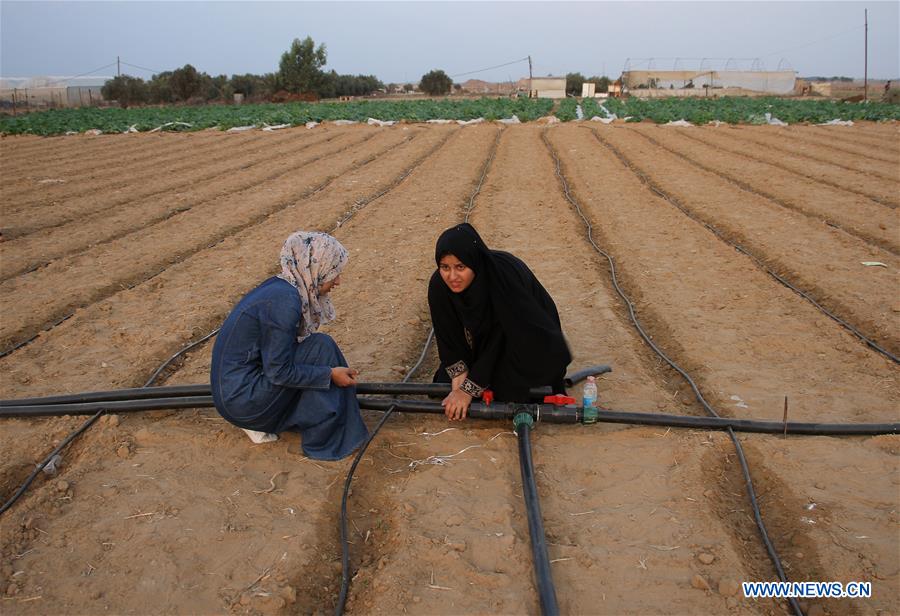
Palestinian women work on a farm near the border between the Gaza Strip and Israel, east of the southern Gaza Strip city of Khan Younis, on Oct. 28, 2020. Israel imposed a security buffer zone of 300 meters along the Gaza Strip's eastern border, claiming that the buffer zone could prevent Palestinian armed factions from launching attacks into the Israeli territory. However, this move took a toll on Gaza's agricultural sector as many fertile lands along the border have become too dangerous for Gazans to approach. (Photo by Rizek Abdeljawad/Xinhua)
by Sanaa Kamal
GAZA, Oct. 27 (Xinhua) -- "It's not easy to come here even in the ordinary days because the Israeli soldiers may shoot us," said Ghaidaa Qudaih, a young Palestinian college graduate who has to become a farmer on the restless border between the Gaza Strip and Israel.
Amid a sluggish job market in Gaza, Qudaih, the 24-year-old woman who studied business administration in college, could not get a job in the Palestinian enclave. Now her livelihood relies on the peas she just sowed onto the land.
To make a living, Qudaih and two other young women rented three dunams of land (3,000 square meters) on the eastern edge of Khan Younis city and planned to sell the products in the local market.
Farming is an arduous and demanding job. The girls had to work hard from early morning until dusk. But that is not the only difficulty they were facing.
"Our land is only 500 meters from the separation fence," said Qudaih, pointing to an Israeli monitoring post not far from where she was standing. They could be shot by the Israeli soldiers if they approached the fence too closely.
Qudaih said they rented this land because it was much less expensive than the others inside the cities. It was the risk they had to take.
Israel imposed a security buffer zone of 300 meters along the Gaza Strip's eastern border, claiming that the buffer zone could prevent Palestinian armed factions from launching attacks into the Israeli territory. However, this move took a toll on Gaza's agricultural sector as many fertile lands along the border have become too dangerous for Gazans to approach.
"Israeli soldiers are not our only danger as poverty and hunger also threaten us, especially when we do not find money that keeps us afloat," Qudaih said, her voice breaking.
She told Xinhua that her parents borrowed about 8,000 U.S. dollars for her four-year education in the university, but unfortunately, she could not pay them back given the dire economic situation of the Palestine enclave.
One of Qudaih's two colleagues, Nadine Abu Rook, who studied finance and banking in college, faced a similar fate.
"I excelled at my university studies and I dreamed that when I graduate, I would go to work in a bank. But all my dreams were shattered on the rock of a grim reality that we currently have in Gaza," the 23-year-old young woman said.
"We have tried several times to get a suitable job to have our own income source, but all of our attempts have failed," said Asil al-Najjar, the other colleague of Quidah's, told Xinhua while she was scattering peas into the soil.
The Israeli blockade has crippled the economy of Gaza and caused the unemployment rate to rise through the roof. According to estimates, more than 80 percent of Gazans are unemployed and many of them educated young people.
Qudaih and her friends are the more resilient ones. If all goes well, they will harvest their peas in January and earn money from work for the first time in their lives.
"We are working hard, and we will prove that we can overcome the main crisis in Gaza, the unemployment, by our will and determination," said Al-Najjar. Enditem



